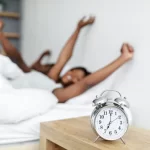As we get older, getting 7-8 hours of uninterrupted sleep seems almost impossible. The body changes and sleep patterns change as well. Older people seem to need less sleep, but this can be detrimental to health. Older folks experience more interrupted sleep and don’t spend as much time in REM sleep, which is where the deepest and most restorative rest comes from.
Getting enough rest is super important for the body’s ability to recover, repair and stay healthy. It keeps our metabolism firing and helps to fight stress. It is also important for emotional balance.
Here are my top 7 tips on how to get enough sleep as you age so that you can feel energetic and live optimally through your senior years.
Going to bed at the same time every night and waking up at the same time every morning will help your body regulate. Often times seniors will either stay up much later than needed and then still continue to wake up very early. This can throw off the body’s natural clock and prevent you from going into the deeper REM phases of sleep.
Make a commitment to wind down before bed by engaging in stress relieving activities (see Tip 5)
Often times seniors will take cat naps throughout the day. This can prevent a good night’s sleep from happening. If you feel tired in the middle of the day, instead of napping get up and move your body. Go for a walk around the block, do some gardening or make a cup of tea.
Another awesome activity is to volunteer and be of service, so that you are out in the world moving your body and helping others,
which will help to create an overall sense of well-being and more restful sleep.
Drinking caffeine any time after the morning hours can affect your sleep. Caffeine stays in the body for up to 12 hours, so if you are super sensitive, it could be a culprit of sleep interruption. It also contributes to osteoporosis and bone loss.
Have a calming cup of herbal tea before bed, or make some Golden Milk, which is a traditional elixir used in India for inducing sleep and fighting inflammation.
Double winner! Not only will you sleep better, your joints will be happy too.Drinking caffeine any time after the morning hours can affect your sleep. Caffeine stays in the body for up to 12 hours, so if you are super sensitive, it could be a culprit of sleep interruption. It also contributes to osteoporosis and bone loss.
Have a calming cup of herbal tea before bed, or make some Golden Milk, which is a traditional elixir used in India for inducing sleep and fighting inflammation.
Double winner! Not only will you sleep better, your joints will be happy too.Drinking caffeine any time after the morning hours can affect your sleep. Caffeine stays in the body for up to 12 hours, so if you are super sensitive, it could be a culprit of sleep interruption. It also contributes to osteoporosis and bone loss.
Have a calming cup of herbal tea before bed, or make some Golden Milk, which is a traditional elixir used in India for inducing sleep and fighting inflammation.
Double winner! Not only will you sleep better, your joints will be happy too.
Exercising at least 20 minutes each day is important for getting beneficial sleep, but be sure not to exercise too close to bed time, unless you are doing light stretching or gentle yoga.
More strenuous exercise can stimulate the endocrine system and release endorphins that may prevent sleep.
Just like routine is important when it comes to good sleep, it’s also helpful to give yourself some wind down time before bed. This includes unplugging from all “blue light” electronics at least an hour or more before your bed time.
The blue light from electronics stimulates the pineal gland which is responsible for producing melatonin, the hormone that helps us sleep. If your pineal gland is on overdrive all the time, your body will not produce the proper amount of melatonin and your sleep will be affected.
Do some light reading, deep breathing, crossword puzzles or a creative activity that doesn’t require too much brain power. This will give your body time to wind down and transition slowly into sleep mode.
Sometimes medication can be a culprit in messing with your zzz’s. If you feel like this may be the case, talk with your doctor about side effects of any medication you are on, and see if you can lower doses or switch to a different medication.
Adding the supplement melatonin each evening before you go to bed can also help support your sleep cycle. But be sure you consult with your physician first if you are on any medication.
Eating clean is not only important for good energy, feeling healthy and living a preventative life but it supports good sleep too.
When we sleep too little our body over-produces a hormone called Ghrelin which signals the body to eat more, especially carbohydrate rich foods. In turn, lack of sleep depletes the hormone Leptin, which is responsible for telling us when we are full.
Cutting sugary foods
and processed foods to a minimum and eating more high-nutrient foods like vegetables, lean proteins, healthy fats and complex carbs will help your sleep regulate. Also be sure to drink plenty of water and cut back on caffeine as mentioned in Tip 3.
Once you start to get more quality sleep you will feel more energetic and happier so you can continue to engage in all the things you love about life!
Begin to follow these simple tips and see how your sleep starts to change and transform








